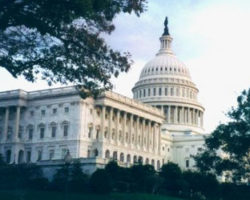A bipartisan majority of the House of Representatives now supports the Local Radio Freedom Act (LRFA) after 12 House Members added their cosponsorship to the resolution opposing “any new performance fee, tax, royalty, or other charge” on local broadcast radio stations.
The resolution, which signals Members of Congress’s opposition to any potential legislation that imposes new performance royalties on broadcast radio stations for music airplay, now has 223 cosponsors in the House and 27 in the Senate.
Adding their support recently for the Local Radio Freedom Act in the House are Reps. Michael Burgess (R-TX-26), Danny Davis(D-IL-7), Mike Garcia (R-CA-25), Chris Jacobs (R-NY-27), Ben McAdams (D-UT-4), Michael McCaul (R-TX-10), John Moolenaar (R-MI-4), Bill Pascrell (D-NJ-9), Brad Schneider (D-IL-10), Kurt Schrader(D-OR-5), Mikie Sherrill (D-NJ-11), Thomas Tiffany (R-WI-7).
“NAB greatly appreciates the bipartisan coalition of Representatives and Senators who have declared their support for hometown radio stations by cosponsoring the Local Radio Freedom Act,” NAB President/CEO Gordon Smith said. “A performance royalty would inhibit musicians’ exposure on free and local radio, hurt stations’ ability to serve their communities, and damage the long-standing relationship between broadcasters and the recording industry. In these difficult times for all businesses, radio broadcasters thank lawmakers for opposing a job-killing performance royalty and look forward to continuing to provide unparalleled promotional value for new and established performing artists.”
Reps. Kathy Castor (D-FL-14) and Michael Conaway (R-TX-11) are the principal cosponsors of the Local Radio Freedom Act in the House of Representatives (H. Con. Res. 20). Sens. John Barrasso (R-WY) and Martin Heinrich (D-NM) are the lead cosponsors of a companion resolution in the Senate (S. Con. Res. 5).
“Congress should not impose any new performance fee, tax, royalty, or other charge relating to the public performance of sound recordings on a local radio station for broadcasting sound recordings over the air, or on any business for the public performance of sound recordings on a local radio station broadcast over the air,” reads the Local Radio Freedom Act.





